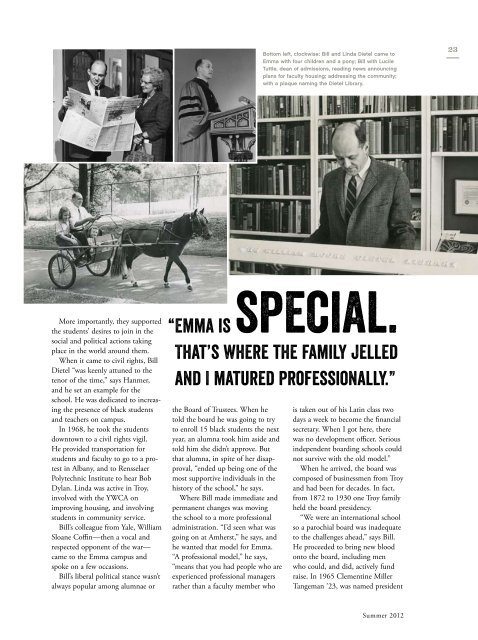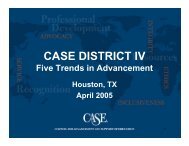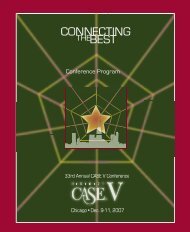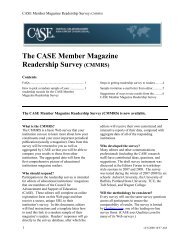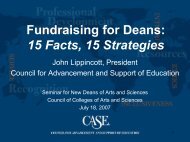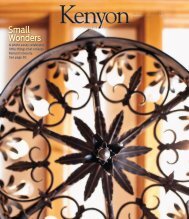22meaningfulmomentsin historyThere were rules for everything,and they were enforced by the two formidable co-headmistresses ofschool—Miss Anne Wellington and Miss Clemewell Lay. These womenhad been at the helm at <strong>Emma</strong> for nearly 20 years and the school theypresided over represented everything that had been prized in educationalcircles but was now being questioned by the emerging Boomer generation:a classical curriculum, social decorum, and nearly 150 years of tradition.The changes beginning to roil society were simmering quietly atthe school, held in check by the two imposing headmistresses, who wererespected and feared.Bill Dietel, who became principal of the school in 1961, succeedingWellington and Lay, remembers a moment as he was poised to take overthe school—a moment that was a beautiful illustration of the old andnew exchanging a bumpy embrace in passing.Before their official installation at <strong>Emma</strong>, Bill and his wife, LindaRemington Dietel ’48, were invited to spend the weekend on campus.Typical of an earlier era and in keeping with the formality of theschool and of the co-headmistresses, a tea with the seniors was plannedin Sage Living Room. Teacakes were served and the legendary GracieBartholomew played the piano.“Anne Wellington turned to me,” says Bill, “and said, ‘I think weshould do the gavotte.’“I looked at Linda. I didn’t know how to do the gavotte.”Bill realized what the rest of the girls knew full well. If AnneWellington said they should do the gavotte, well, it was time to do thegavotte. With Gracie’s piano accompaniment, the 33-year old Bill tookthe 64-year old Miss Wellington into his arms and they danced in frontof the transfixed seniors.“She led me!” Bills says. “Believe you me, Anne Wellington led mein the gavotte !”And on that note, Bill Dietel danced into his life at <strong>Emma</strong>.Once they moved to campus, Bill and Linda needed no such formalevents to get to know their students. They had four young children atthe time (a fifth was born while they were at <strong>Emma</strong>) and a pony. TheDietels would put their kids in a cart and let the little pony pull itaround the sidewalks on the inner campus. Needless to say, the studentswere captivated.That pony perhaps pointed the way to the Dietel's future life—on afarm, or, as their children like to call it, a “Fark”—part farm, part park.In Virginia rolling farm country, it includes homes for Bill and Linda,and for their daughter, Betsy, and her family.The farm part is Linda’s doing. She raised sheep for many years anddescribes herself as a retired sheep farmer. But “retired” for Linda doesnot mean sitting home knitting. She is heavily involved in communityand nonprofit fund raising, she created a foundation to support localpublic education, and she is active in the local Democratic Party. Bill,too, is active in the community (the two were named 2007 Citizens ofthe Year for service to the Rappahannock County), but his main businessis running an international philanthropic advising firm, helpingmajor investors use philanthropy for social change. Three of his childrenare principals in this firm.Though it has been more than 40 years since Bill and Linda’s tenureat <strong>Emma</strong>, they still feel deeply connected to the school. It is more thanthe fact that Linda is an alumna, that two of their daughters went to<strong>Emma</strong>, that Linda served on the Board of Trustees and was its president,and that she and Bill chaired the majorgifts part of a capital campaign in 1980and played a leadership role in the campaignof the 1990s.“We’ve had an association with theschool since 1946,” says Bill. “I wentto Exeter for four years during the warand I’ve remained very attached. I wentto Princeton, did graduate work at Yale.But <strong>Emma</strong>. <strong>Emma</strong> is special. That’swhere the family jelled and I maturedprofessionally,” says Bill.When Bill O Linda arrived in 1961, Billwas 33, Linda, 30. They came fromAmherst College, where Bill had beenassistant dean of the college. The arrivalof this young couple, with four youngchildren and a pony, was nothing lessthan astonishing.“He was a breath of fresh air,”says Trudy Hanmer, Associate HeadEmerita, whose history of the school,Wrought With Steadfast Will: A Historyof <strong>Emma</strong> Willard School is being publishedthis winter. “In January of thatyear, JFK was inaugurated and thereare a lot of parallels.”It was common at the time for thewives of secondary school heads to takeon major roles in running the schools,though they were unpaid and oftenunrecognized. Linda was a major assetto Bill and to the <strong>Emma</strong> community.“Linda was really co-principal,” Billsays. “It was fortunate for me,” saysLinda. “I knew the school inside outand backwards. A lot of faculty membersI had were still there.”At the time, the girls woreuniforms and the rules and regulationswere strictly upheld. Accordingto Hanmer, “there were rules for everything—evenhow you picked up yourfork.” The students were bridling underthe regulations, some of which were relicsof an earlier era.Though the Dietels did not abolishthe rulebook entirely, they did begin toloosen the strictures, “Bit by bit thesethings changed,” says Bill. “Not fastenough to suit all the girls, but movingin the right direction.”emma
Bottom left, clockwise: Bill and LInda Dietel came to<strong>Emma</strong> with four children and a pony; Bill with LucileTuttle, dean of admissions, reading news announcingplans for faculty housing; addressing the community;with a plaque naming the Dietel Library.23More importantly, they supportedthe students’ desires to join in thesocial and political actions takingplace in the world around them.When it came to civil rights, BillDietel “was keenly attuned to thetenor of the time,” says Hanmer,and he set an example for theschool. He was dedicated to increasingthe presence of black studentsand teachers on campus.In 1968, he took the studentsdowntown to a civil rights vigil.He provided transportation forstudents and faculty to go to a protestin Albany, and to RensselaerPolytechnic Institute to hear BobDylan. Linda was active in Troy,involved with the YWCA onimproving housing, and involvingstudents in community service.Bill’s colleague from Yale, WilliamSloane Coffin—then a vocal andrespected opponent of the war—came to the <strong>Emma</strong> campus andspoke on a few occasions.Bill’s liberal political stance wasn’talways popular among alumnae or“<strong>Emma</strong> is special.That’s where the family jelledand I matured professionally.”the Board of Trustees. When hetold the board he was going to tryto enroll 15 black students the nextyear, an alumna took him aside andtold him she didn’t approve. Butthat alumna, in spite of her disapproval,“ended up being one of themost supportive individuals in thehistory of the school,” he says.Where Bill made immediate andpermanent changes was movingthe school to a more professionaladministration. “I’d seen what wasgoing on at Amherst,” he says, andhe wanted that model for <strong>Emma</strong>.“A professional model,” he says,“means that you had people who areexperienced professional managersrather than a faculty member whois taken out of his Latin class twodays a week to become the financialsecretary. When I got here, therewas no development officer. Seriousindependent boarding schools couldnot survive with the old model.”When he arrived, the board wascomposed of businessmen from Troyand had been for decades. In fact,from 1872 to 1930 one Troy familyheld the board presidency.“We were an international schoolso a parochial board was inadequateto the challenges ahead,” says Bill.He proceeded to bring new bloodonto the board, including menwho could, and did, actively fundraise. In 1965 Clementine MillerTangeman ’23, was named presidentSummer 2012


